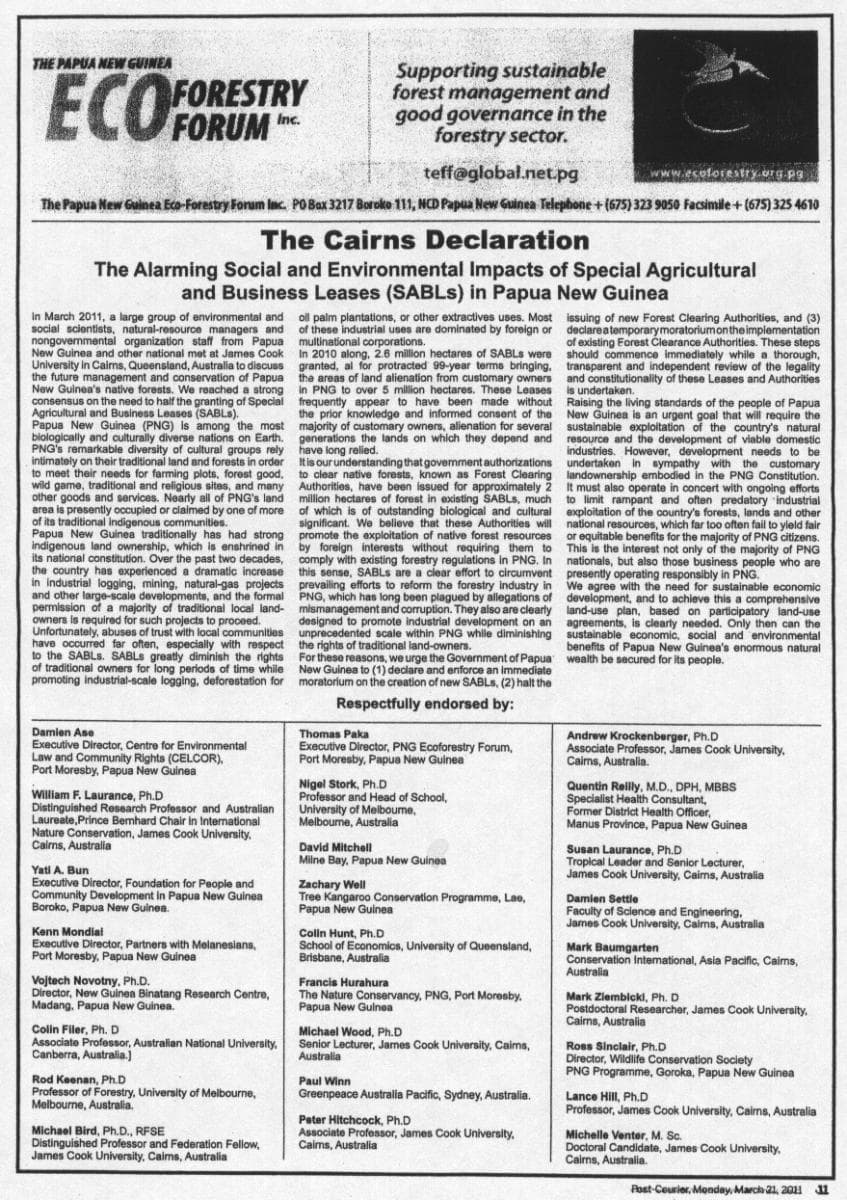Over 10% of customary land lost in dodgy agriculture leases
There has been a massive increase in the alienation and the conversion of customary land in recent years through the issuing of special agriculture and business leases (SABLs).
The allocation of these leases, some covering hundreds of thousands of hectares, seems to be occurring outside all proper legal channels and without the informed consent of affected landowners. The leases are being handed out by the Department of Lands without compliance with relevant laws, which indicates either negligence or fraud on the part of lands officers and the government.
Recent statistics show that as of January 2011, over 5 million hectares of customary land have been acquired under SABLs - an alarming increase of over 2.7 million hectares in just one year.
This means that the amount of land under customary ownership has now effectively decreased from 97% to about 86% of Papua New Guinea's total land mass.
This threatens the livelihood of hundreds of thousands of people as about 80 percent of the population live in the rural areas. The leases mean local people can be denied access to their land and forests which they depend on for their livelihood and survival.
Even more alarmingly, these people face possible displacement from their land which will inevitably cause conflicts as pressure builds in adjoining areas. Our current annual population growth rate of more than 2 percent will only exacerbate these problems.
A large groups of scientists, natural resource managers and non-government organisations recently met in Australia and discussed the issue of SABLs and land alienation. As a result of those discussions The Cairns Declaration was issued
The Alarming Social and Environmental Impacts of Special Agricultural and Business Leases (SABLs) in Papua New Guinea

Papua New Guinea (PNG) is among the most biologically and culturally diverse nations on Earth. PNG’s remarkable diversity of cultural groups rely intimately on their traditional lands and forests in order to meet their needs for farming plots, forest goods, wild game, traditional and religious sites, and many other goods and services. Nearly all of PNG’s land area is presently occupied or claimed by one or more of its traditional indigenous communities.
Papua New Guinea traditionally has had strong indigenous land ownership, which is enshrined in its national constitution. Over the past two decades, the country has experienced a dramatic increase in industrial logging, mining, natural-gas projects and other large-scale developments, and the formal permission of a majority of traditional local land-owners is required for such projects to proceed.
Unfortunately, abuses of trust with local communities have occurred far too often, especially with respect to the SABLs. SABLs greatly diminish the rights of traditional owners for long periods of time while promoting industrial-scale logging, deforestation for oil palm plantations, or other extractive uses. Most of these industrial uses are dominated by foreign or multinational corporations.
In 2010 alone, 2.6 million hectares of SABLs were granted, all for protracted 99-year terms, bringing the area of land alienated from customary owners in PNG to over 5 million hectares.
These Leases frequently appear to have been made without the prior knowledge and informed consent of the majority of customary owners, alienating for several generations the lands on which they depend and have long relied.
It is our understanding that government authorizations to clear native forests, known as Forest Clearing Authorities, have been issued for approximately 2 million hectares of forest in existing SABLs, much of which is of outstanding biological and cultural significance. We believe that these Authorities will promote the exploitation of native forest resources by foreign interests without requiring them to comply with existing forestry regulations in PNG.
In this sense, SABLs are a clear effort to circumvent prevailing efforts to reform the forestry industry in PNG, which has long been plagued by allegations of mismanagement and corruption.
They also are clearly designed to promote industrial developments on an unprecedented scale within PNG while diminishing the rights of traditional land-owners.
For these reasons, we urge the Government of Papua New Guinea to (1) declare and enforce an immediate moratorium on the creation of new SABLS, (2) halt the issuing of new Forest Clearing Authorities, and (3) declare a temporary moratorium on the implementation of existing Forest Clearing Authorities.
These steps should commence immediately while a thorough, transparent and independent review of the legality and constitutionality of these Leases and Authorities is undertaken.
Raising the living standards of the people of Papua New Guinea is an urgent goal that will require the sustainable exploitation of the country’s natural resources and the development ofviable domestic industries. However, development needs to be undertaken in sympathy with the customary landownership embodied in the PNG Constitution. It must also operate in concert with ongoing efforts to limit rampant and often predatory industrial exploitation of the country’s forests, lands and other natural resources, which far too often fail to yield fair or equitable benefits for the majority of PNG citizens. This is the interest not only of the majority of PNG nationals, but also of those businesspeople who are presently operating responsibly in PNG.
We agree with the need for sustainable economic development, and to achieve this a comprehensive land-use plan, based on participatory land-use agreements, is clearly needed.
Only then can the sustainable economic, social and environmental benefits of Papua New Guinea’s enormous natural wealth be secured for its people.
